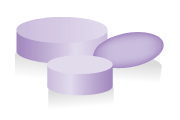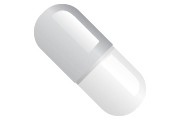Pancreatin for pancreatic insufficiency
This leaflet is for parents and carers about how to use this medicine in children. Our information may differ from that provided by the manufacturers, because their information usually relates to adults. Read this leaflet carefully. Keep it somewhere safe so that you can read it again.
Name of medicine
Pancreatin (PAN-kree-at-in)
Brand names: Creon®, Nutrizym®, Pancrex®, Pancrease HL®
This leaflet is about the use of pancreatin for children who do not produce enough digestive enzymes, a condition called pancreatic insufficiency. This happens most commonly in cystic fibrosis but it may have other causes.
Why is it important for my child to take pancreatin?
The pancreas produces enzymes that help to digest food. In pancreatic insufficiency, the pancreas does not make enough of these enzymes. Pancreatin contains three types of enzyme (protease, lipase, amylase), which digest the food your child eats so their body can use it to stay healthy.
What is pancreatin available as?
Pancreatin comes as tablets, capsules, granules and powder.
There are many different types of pancreatin. The different medicines contain different amounts of the enzymes. Your doctor will prescribe the right one for your child.
These may contain lactose and some animal products. If you have any concerns or questions, speak with your child’s doctor or pharmacist.
When should I give pancreatin
You will need to give pancreatin with every meal and large snack. This is at least three times a day. Give the medicine just before your child starts eating, or straight after they have finished. Your dietician will provide you with more information about how much to give and with what type of snack.
How much should I give?
Your doctor / dietician will work out the amount of pancreatin (the dose) that is right for your child. The dose will be shown on the medicine label.
The dose of pancreatin may need to be changed depending on how well your child is digesting their food. Do not change the dose unless your doctor tells you to.
It is important that you follow your doctor’s instructions about how much to give.
How should I give pancreatin?

Tablets
- Tablets should be swallowed whole with a glass of water, milk or juice. You should not crush the tablet. Your child should not chew the tablet.

Capsules
Capsules should be swallowed with a glass of water, milk or acidic juice (such as orange or pineapple juice). Your child should not chew the capsule. You can open the capsule and mix the contents with a small amount of soft food such as yogurt. Do not crush the contents. Make sure your child swallows it straight away, without chewing.

Granules or powder
You will be given a scoop to allow you to measure the correct amount of granules/powder. It is important that you use this every time, to make sure you give the correct dose. Mix the correct amount with a small amount of soft food or a small drink of milk or water. Your child should swallow the food or drink straight away without chewing. Make sure that they take it all.
It is important that pancreatin is taken with a full glass of liquid. Your child should also drink plenty of water throughout the day (at least 4 or 5 large cups) when taking pancreatin, so they do not become dehydrated. This is particularly important if they are taking Creon® 25,000, Creon® 40,000, Nutrizym® 22 or Pancrease HL®.
Do not mix granules/powder with hot food or drink, or it may not work.
Pancreatin may irritate your child’s mouth if they do not swallow it straight away.
When should the medicine start working?
It may take a few weeks for pancreatin to work properly and you may not see any difference in your child. It is important that you continue to give pancreatin with every meal during this time. If you are worried about whether it is working, talk to your doctor but continue to give the medicine.
What if my child is sick (vomits)?
If your child is sick less than 30 minutes after having a dose of pancreatin, give them the same dose when they next have something to eat.
If your child is sick more than 30 minutes after having a dose of pancreatin, you do not need to give them another dose. Wait until the next normal dose.
If your child is sick again, seek advice from your GP, pharmacist or hospital. They will decide what to do based on your child’s condition and the specific medicine involved.
What if I forget to give it?
If you forget to give a dose of pancreatin at a mealtime do not give this missed dose. Wait until the next meal or snack before giving another dose.
Never give a double dose of pancreatin.
What if I give too much?
If you think you may have given your child too much pancreatin, give them a large cup of water to drink and contact your doctor or local NHS services (111 in England and Scotland; 0845 4647 in Wales) straight away. Have the medicine or packaging with you if you telephone for advice.
It can be dangerous to give too much pancreatin.
Are there any possible side effects?
We use medicines to make our children better, but sometimes they have other effects that we don’t want (side effects).
Side effects you must do something about
If your child is short of breath or is wheezing, or their face, lips or tongue start to swell, or they develop a rash, they may be allergic to pancreatin. Take your child to hospital or phone for an ambulance straight away.
If your child gets stomach cramps or bad stomach pain that will not go away, contact your doctor or take your child to hospital straight away, as there may be a problem with your child’s intestines.
Other side-effects you need to know about
Your child may get mild stomach pains, diarrhoea or constipation or feel sick (nausea) or be sick (vomit). If this continues for more than a few days, contact your doctor as they may want to change the dose of
pancreatin.Your child may get a sore mouth or back passage (rectum). If this happens, discuss it with your doctor at your next visit. Make sure your child swallows the medicine as quickly as possible after putting it in their mouth, to reduce the risk of getting a sore mouth. Use of a barrier cream for the mouth and/or for the bottom may help; your local pharmacist or doctor will be able to advise.
There may sometimes be other side effects that are not listed above. If you notice anything unusual and are concerned, contact your doctor. You can report any suspected side effects to a UK safety scheme at mhra.gov.uk/yellowcard
More information on side-effects can be found in a leaflet on our website.
Can other medicines be given at the same time as pancreatin?
- You can give your child medicines that contain paracetamol or ibuprofen, unless your doctor has told you not to.
Check with your doctor or pharmacist before giving any other medicines to your child. This includes herbal and complementary medicines.
Do not give your child laxatives or indigestion remedies if they are taking the higher strength versions, such as Pancrease HL® or Nutrizym® 22, unless your doctor has told you to, as they may increase the risk of damage to your child’s intestines.
Is there anything else I need to know about this medicine?
Pancreatin is made from the pancreases of pigs. If your child is allergic to pork or cannot have pork for any other reason, tell your doctor before giving pancreatin.
Pancreatin contains three enzymes: protease, amylase and lipase. There are many different tablets, capsules and powders that contain different amounts of these enzymes. Your doctor will check how your child is doing and may change their prescription to a medicine with different amounts of the enzymes. It is important to keep all your appointments with the doctor or nurse.
Your child’s stools (poo) will need to be checked to see how well your child is digesting their food. Your doctor or nurse will tell you how to collect stool samples and whether or not you will need to adjust the dose of pancreatin for your child.
Some people develop itchiness or a rash on their hands if they touch the powder or capsule contents. If this happens, wear thin gloves when handling the medicine.
General advice about medicines
- If you are not sure a medicine is working, contact your doctor but continue to give the medicine as usual in the meantime. Do not give extra doses, as you may do harm.
- Only give this medicine to your child. Never give it to anyone else, even if their condition appears to be the same, as this could do harm.
- Make sure that you always have enough medicine. Order a new prescription at least 2 weeks before you will run out.
- Make sure that the medicines you have at home have not reached the ‘use by’ date on the packaging. Give old medicines to your pharmacist to dispose of.
If you think someone else may have taken the medicine by accident, contact your doctor straight away.
Where should I keep this medicine?
- Keep the medicine in a cupboard, away from heat and direct sunlight.
- Make sure that children cannot see or reach the medicine.
- Keep the medicine in the container it came in.
Pancrex® products must be kept in the fridge.
Who to contact for more information?
Your doctor, pharmacist or nurse will be able to give you more information about pancreatin and about other medicines used to treat pancreatic insufficiency.
England: NHS 111
Tel 111
www.nhs.ukScotland: NHS 24
Tel 111
www.nhs24.scotNorthern Ireland: NI Direct
Wales: NHS 111 Wales
Tel 111
www.111.wales.nhs.ukCystic Fibrosis Trust
0300 373 1000
www.cysticfibrosis.org.uk/Copyright disclaimer
Version [2]. © NPPG, RCPCH and WellChild, all rights reserved. Review by November 2018.
The primary source for the information in this leaflet is the British National Formulary for Children. For details on any other sources used for this leaflet, please contact us through our website, www.medicinesforchildren.org.uk.
We take great care to make sure that the information in this leaflet is correct and up-to-date. However, medicines can be used in different ways for different patients. It is important that you ask the advice of your doctor or pharmacist if you are not sure about something. This leaflet is about the use of these medicines in the UK, and may not apply to other countries. The Royal College of Paediatrics and Child Health (RCPCH), the Neonatal and Paediatric Pharmacists Group (NPPG), WellChild and the contributors and editors cannot be held responsible for the accuracy of information, omissions of information, or any actions that may be taken as a consequence of reading this leaflet.
